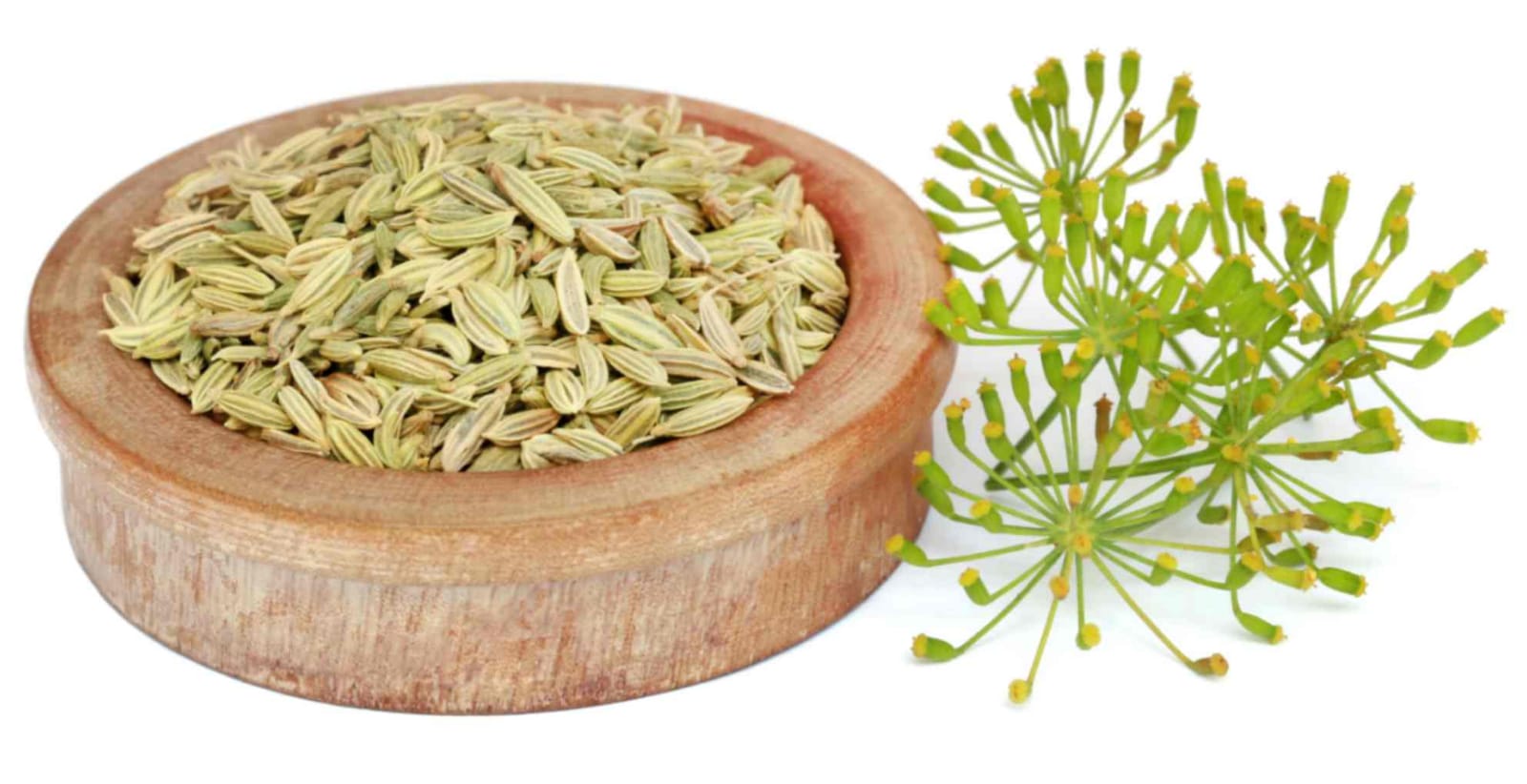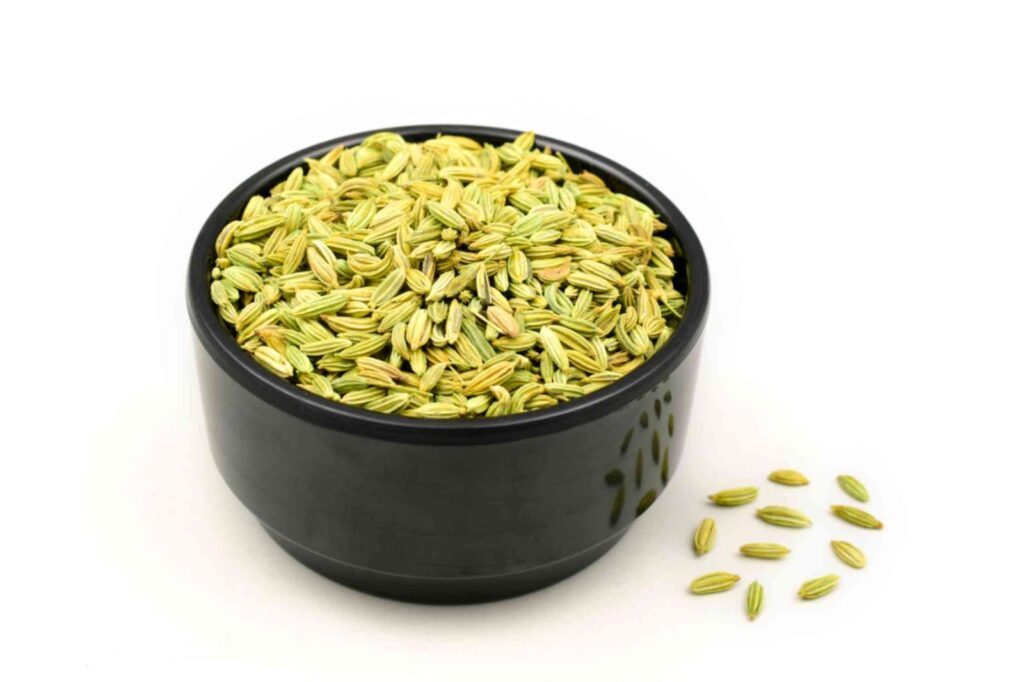Fennel seeds are the dried seeds of the Foeniculum vulgare plant, a flowering herb belonging to the carrot family (Apiaceae). These seeds are native to the Mediterranean region but are now widely used in various cuisines and herbal remedies around the world.
Characteristics of Fennel Seeds:
- Appearance: Fennel seeds are small, elongated, and slightly curved, resembling tiny ridged grains. They have a greenish-brown to yellowish-brown color.
- Flavor and Aroma: Fennel seeds have a sweet, aromatic flavor with a hint of licorice or anise. They are often used as a spice to add a subtle, slightly sweet taste to dishes.
Common Uses:
Fennel seeds have versatile culinary and medicinal applications:
- Culinary Uses: Fennel seeds are a common spice in many cuisines, especially in Indian, Mediterranean, and Middle Eastern cooking. They are used to flavor various dishes, including soups, stews, bread, pickles, and sausages. Fennel seeds are also a key ingredient in Italian sausage.
- Herbal Remedies: Fennel seeds have been used in traditional medicine for their potential health benefits. They are often brewed into fennel tea, which is believed to aid digestion and relieve bloating and gas.
- Mouth Freshener: Fennel seeds are sometimes used as a natural breath freshener and digestive aid after meals in some cultures.
Nutritional Content:
Fennel seeds are low in calories and provide essential nutrients like fiber, vitamins (such as vitamin C), and minerals (including calcium, magnesium, and potassium). They are also a source of antioxidants and volatile oils that contribute to their flavor and potential health benefits.
- Calories: 19 calories
- Carbohydrates: 3.7 grams
- Dietary Fiber: 2.3 grams
- Sugars: 0.1 grams
- Protein: 0.7 grams
- Fat: 0.6 grams
- Saturated Fat: 0.1 grams
- Monounsaturated Fat: 0.1 grams
- Polyunsaturated Fat: 0.3 grams
- Vitamins and Minerals:
- Vitamin C: 2.1 milligrams (3% of the Daily Value)
- Vitamin B6: 0.03 milligrams (2% of the Daily Value)
- Calcium: 47 milligrams (5% of the Daily Value)
- Iron: 0.64 milligrams (8% of the Daily Value)
- Magnesium: 10 milligrams (3% of the Daily Value)
- Phosphorus: 10 milligrams (1% of the Daily Value)
- Potassium: 42 milligrams (1% of the Daily Value)
- Zinc: 0.08 milligrams (1% of the Daily Value)
Potential Health Benefits:
Consuming fennel seeds or fennel seed tea is associated with several potential health benefits, including aiding digestion, reducing bloating, and providing antioxidant compounds. However, it’s essential to consult with a healthcare professional before using fennel seeds for medicinal purposes, especially if you have specific health concerns or are taking medications.
What are the health benefits of fennel seeds?
Fennel seeds, derived from the aromatic fennel plant (Foeniculum vulgare), have been used for centuries for their culinary and medicinal properties. These tiny seeds pack a powerful punch of flavor and offer a range of potential health benefits:
- Digestive Aid: Fennel seeds are well-known for their digestive benefits. They can help alleviate indigestion, bloating, and gas. Chewing on a few fennel seeds after a meal is a common practice in many cultures to aid digestion.
- Antioxidant Properties: Fennel seeds contain antioxidants like flavonoids and polyphenols, which can help combat oxidative stress and reduce the risk of chronic diseases.
- Anti-Inflammatory: The compounds in fennel seeds have anti-inflammatory properties that may help reduce inflammation in the body, potentially benefiting conditions like arthritis.
- Respiratory Health: Fennel seeds are often used to relieve respiratory issues such as coughs and bronchitis. They may help clear congestion and soothe a sore throat.
- Mental Health: Fennel seeds contain anethole, which has been linked to improved cognitive function and may help reduce symptoms of depression.
- Hormone Regulation: Fennel seeds have phytoestrogens, which are plant compounds that can help regulate hormones. This can be particularly beneficial for menopausal women.
- Blood Sugar Control: Some studies suggest that fennel seeds may help regulate blood sugar levels and improve insulin sensitivity, making them potentially beneficial for individuals with diabetes.
- Heart Health: Fennel seeds contain potassium, which can help regulate blood pressure. They may also have a mild cholesterol-lowering effect, reducing the risk of heart disease.
- Weight Management: Fennel seeds are low in calories and high in fiber, which can promote feelings of fullness and aid in weight management.
- Antimicrobial Properties: Fennel seeds have antimicrobial properties that may help combat bacteria, making them useful for oral health and fighting bad breath.
- Menstrual Relief: Fennel tea is sometimes used to alleviate menstrual discomfort and reduce symptoms like bloating and cramps.
- Skin Health: The antioxidants in fennel seeds may help protect the skin from damage caused by free radicals, contributing to a healthy complexion.
It’s important to note that while fennel seeds offer these potential health benefits, they should be consumed in moderation as part of a balanced diet. Some individuals may be allergic to fennel or experience side effects like skin irritation or allergic reactions. If you have specific health concerns or conditions, it’s advisable to consult with a healthcare professional before incorporating fennel seeds or supplements into your diet for therapeutic purposes.

How to use fennel seeds for digestion?
Fennel seeds have a long history of use as a natural remedy for digestive issues. Here are some ways you can use fennel seeds to aid digestion:
- Chew Fennel Seeds: After a meal, simply chew on a small amount of fennel seeds. This can help freshen your breath and stimulate the production of digestive enzymes, which can aid in digestion. It’s a common practice in many cultures.
- Fennel Tea: Fennel tea is a soothing and effective way to promote digestion. To make fennel tea:
- Crush about a teaspoon of fennel seeds.
- Boil a cup of water and pour it over the crushed seeds.
- Cover and steep for 10-15 minutes.
- Strain and drink the tea after your meal.
- Fennel Seed Infused Water: You can also infuse your drinking water with fennel seeds. Simply add a teaspoon of crushed fennel seeds to a glass of water and let it sit for a few hours before drinking.
- Fennel Seed Oil: Fennel seed essential oil is available and can be diluted with a carrier oil (like olive oil) and massaged onto the abdomen in a clockwise motion. This massage can help relieve gas and bloating.
- Fennel Seed Capsules: Fennel seed supplements in the form of capsules or tablets are available. Always follow the recommended dosage on the product label and consult with a healthcare professional before using supplements.
- Culinary Uses: Incorporate fennel seeds into your cooking. They can be added to soups, stews, curries, and roasted vegetables for flavor and potential digestive benefits.
- Fennel Seed Poultice: You can make a poultice by crushing fennel seeds and mixing them with warm water to form a paste. Apply the paste to the abdomen and cover with a cloth for a soothing effect.
- Fennel Seed and Ginger Tea: Combining fennel seeds with ginger can enhance digestive benefits. You can make a tea by steeping crushed fennel seeds and ginger slices together in hot water.
Remember that while fennel seeds can be helpful for many people in aiding digestion, individual responses may vary. If you have chronic or severe digestive issues, it’s essential to consult with a healthcare professional to rule out underlying conditions and receive personalized guidance. Additionally, if you’re pregnant or nursing, consult with a healthcare provider before using fennel seeds for digestive purposes.
Are fennel seeds good for weight loss?
- Low in Calories: Fennel seeds are low in calories, making them a flavorful addition to meals and snacks without significantly increasing your caloric intake. They can add taste and texture to your dishes without adding excess calories.
- Fiber Content: Fennel seeds contain dietary fiber, which can promote feelings of fullness and reduce overall food intake. When you feel fuller for longer, you’re less likely to overeat or snack between meals.
- Appetite Suppressant: Some people find that chewing on fennel seeds after a meal can help curb their appetite and reduce cravings for sweets or unhealthy snacks.
- Digestive Benefits: Improved digestion can indirectly support weight loss. Fennel seeds are known to aid digestion and reduce bloating and discomfort after meals, which can make you feel more comfortable and less likely to overeat.
- Hydration: Fennel seeds can be used to make fennel tea, which is hydrating and can help control appetite. Staying hydrated is important for overall health and can help with weight management.
- Natural Flavor: Fennel seeds have a unique and slightly sweet flavor that can enhance the taste of foods without the need for added sugars or unhealthy seasonings.
While fennel seeds can be a helpful addition to a weight loss plan, it’s crucial to remember that no single food or ingredient can guarantee weight loss on its own. Successful weight management typically involves a combination of factors, including a balanced and calorie-controlled diet, regular physical activity, portion control, and healthy lifestyle choices.
If you’re considering using fennel seeds or any other natural remedy as part of your weight loss efforts, it’s a good idea to consult with a healthcare professional or a registered dietitian. They can provide personalized guidance and ensure that you’re taking a comprehensive approach to achieving your weight loss goals while maintaining your overall health and well-being.
What is fennel tea, and how do you make it?
Ingredients:
- 1 teaspoon of fennel seeds (crushed or whole)
- 1 cup of boiling water
Instructions:
- Crush the Fennel Seeds (Optional): While it’s not necessary, crushing the fennel seeds slightly can help release more flavor and aroma. You can use a mortar and pestle or the back of a spoon to gently crush the seeds.
- Boil Water: Heat a cup of water to boiling point.
- Add Fennel Seeds: Place the crushed or whole fennel seeds into a teapot or heatproof cup.
- Pour Boiling Water: Pour the boiling water over the fennel seeds in the teapot or cup.
- Steep: Allow the fennel seeds to steep in the hot water for about 5-10 minutes. The longer you steep, the stronger the flavor will be.
- Strain (Optional): If you prefer, strain the tea to remove the fennel seeds before drinking. However, many people enjoy fennel tea with the seeds still in the cup.
- Serve: Enjoy your fennel tea as is, or you can add a touch of honey or lemon for extra flavor if desired.
Can fennel seeds help with bloating and gas?
Yes, fennel seeds are known for their potential to help with bloating and gas. They have a long history of traditional use in various cultures as a natural remedy for digestive discomfort. Here’s how fennel seeds may aid in alleviating bloating and gas:
- Carminative Properties: Fennel seeds contain compounds, such as anethole and fenchone, that have carminative properties. Carminatives are substances that help relieve gas and reduce bloating by promoting the expulsion of gas from the digestive tract.
- Muscle Relaxant: Fennel seeds can help relax the muscles in the gastrointestinal tract, including the stomach and intestines. This relaxation can ease the movement of gas and alleviate discomfort.
- Antispasmodic Effects: Fennel seeds also possess antispasmodic properties, which means they can help reduce spasms or cramps in the digestive system. This can be particularly helpful in relieving gas-related abdominal cramps.
How to Use Fennel Seeds for Bloating and Gas:
- Fennel Tea: One of the most common ways to use fennel seeds for digestive relief is by making fennel tea. Simply steep crushed or whole fennel seeds in hot water, as described in a previous response, and drink it before or after meals.
- Chewing Fennel Seeds: Some people prefer to chew fennel seeds directly after a meal to aid in digestion. Chewing the seeds can also help release their essential oils, enhancing their effectiveness.
- Fennel Seed Supplements: Fennel seed supplements, such as capsules or extracts, are available and can be taken as directed. Consult with a healthcare professional before starting any new supplements.
- Fennel-Containing Recipes: Fennel seeds can be incorporated into various dishes and recipes, adding flavor while potentially providing digestive benefits.
It’s important to note that while fennel seeds can be a natural remedy for mild digestive discomfort, persistent or severe digestive issues should be evaluated by a healthcare professional. Additionally, individual responses to fennel seeds may vary, and it’s advisable to consult with a healthcare provider, particularly if you have specific dietary restrictions, allergies, or underlying medical conditions.
How do fennel seeds promote oral health?
- Antibacterial Properties: Fennel seeds contain natural antibacterial compounds that can help inhibit the growth of harmful bacteria in the mouth. These antibacterial properties can contribute to fresher breath and a cleaner mouth.
- Anti-Inflammatory Effects: Fennel seeds have anti-inflammatory properties that may help reduce inflammation and irritation in the oral tissues. This can be particularly beneficial for individuals with conditions like gingivitis or mild mouth sores.
- Aromatic Flavor: The aromatic and slightly sweet flavor of fennel seeds can help mask bad breath and leave a pleasant taste in the mouth.
- Stimulating Saliva Production: Chewing fennel seeds can stimulate saliva production. Saliva plays a crucial role in oral health by helping to rinse away food particles, bacteria, and acids, which can contribute to tooth decay and gum disease.
- Natural Mouth Freshener: In some cultures, fennel seeds are used as a natural mouth freshener after meals. Chewing fennel seeds can help reduce post-meal odor and leave the mouth feeling refreshed.
How to Use Fennel Seeds for Oral Health:
To promote oral health with fennel seeds, you can:
- Chew Fennel Seeds: Simply chew a small amount of fennel seeds after meals or whenever you want to freshen your breath. Chewing fennel seeds can also help stimulate saliva production.
- Make Fennel Seed Mouthwash: You can prepare a homemade fennel seed mouthwash by steeping fennel seeds in hot water, allowing it to cool, and using it as a rinse after brushing your teeth.
- Combine with Other Ingredients: Some people combine fennel seeds with other ingredients like cardamom, cloves, or mint leaves to create their custom mouth fresheners.
- Fennel Tea: Fennel tea can also be consumed as a beverage. While it may not provide the same chewing action, drinking fennel tea can still offer potential oral health benefits.
Are there any side effects of consuming fennel seeds?
- Allergic Reactions: While rare, some individuals may be allergic to fennel or other plants in the Apiaceae family (carrot family), which includes fennel. Allergic reactions can include skin rashes, itching, swelling, or difficulty breathing. If you suspect an allergy to fennel, discontinue use and seek medical attention.
- Pregnancy and Breastfeeding: Pregnant and breastfeeding women should exercise caution with fennel seeds. While fennel is often used traditionally to promote lactation in nursing mothers, excessive consumption may have adverse effects. It’s best to consult with a healthcare professional before using fennel seeds during pregnancy or lactation.
- Hormone Effects: Fennel contains compounds that have estrogen-like properties, which may affect hormone levels in the body. Individuals with hormone-sensitive conditions, such as hormone-related cancers or endometriosis, should consult with a healthcare provider before using fennel seeds regularly.
- Blood Clotting: Fennel seeds may have a mild anticoagulant (blood-thinning) effect. If you are taking anticoagulant medications or have a bleeding disorder, consult with a healthcare provider before consuming fennel seeds in large amounts.
- Gastrointestinal Irritation: Some people may experience mild gastrointestinal irritation, such as heartburn or upset stomach, after consuming fennel seeds in large quantities. Using fennel seeds in moderation is generally well-tolerated.
- Photosensitivity: Fennel contains certain compounds that may make the skin more sensitive to sunlight. If you consume fennel seeds regularly and spend extended periods in the sun, take precautions to protect your skin from excessive sun exposure.
- Interactions with Medications: Fennel seeds may interact with certain medications or affect their absorption. If you are taking medications, especially those related to hormone regulation or blood clotting, discuss the use of fennel seeds with your healthcare provider to avoid potential interactions.
Do fennel seeds have any potential contraindications with medications?
- Blood-Thinning Medications: Fennel seeds contain compounds that may have mild antiplatelet effects, which means they could potentially interfere with blood-thinning medications like warfarin (Coumadin) or antiplatelet drugs like aspirin. If you are taking these medications, it’s advisable to consult with your healthcare provider before consuming fennel seeds in large quantities or as a supplement.
- Hormone-Related Medications: Fennel seeds contain phytoestrogens, which are plant compounds that can mimic the effects of estrogen in the body. If you are taking hormone-related medications, such as hormone replacement therapy or certain birth control pills, it’s essential to discuss the potential interactions with your healthcare provider.
- Allergies: Some individuals may be allergic to fennel or fennel seeds, leading to symptoms like skin rashes, itching, swelling, or respiratory issues. If you suspect an allergy or experience any adverse reactions after consuming fennel seeds, seek medical attention immediately.
- Sensitivity to Anethole: Anethole is a compound found in fennel seeds responsible for their licorice-like flavor. Some people may have a sensitivity to anethole, which can lead to digestive discomfort, nausea, or headaches. If you experience these symptoms, reduce or avoid fennel seed consumption.
- Pregnancy and Breastfeeding: While fennel seeds are often recommended to relieve digestive discomfort during pregnancy, it’s essential to consult with a healthcare provider before using fennel supplements or consuming them in large quantities during pregnancy or while breastfeeding.
Can fennel seeds be used as a spice in cooking?
- Roasted Dishes: Fennel seeds can be sprinkled over roasted vegetables, such as carrots, potatoes, or butternut squash, to add a warm and slightly sweet flavor.
- Curries and Stews: They are often used in Indian and Middle Eastern cuisine to season curries, stews, and rice dishes. Fennel seeds can add depth and complexity to these dishes.
- Sausage and Meat Seasoning: Fennel seeds are a key ingredient in Italian sausage, providing a distinctive flavor. They can also be used to season other meats, such as pork or chicken.
- Breads and Baked Goods: Fennel seeds can be added to bread dough or used as a topping for breadsticks and focaccia. They can also be incorporated into biscotti and other baked treats.
- Pickles and Preserves: Fennel seeds are used to flavor pickles, relishes, and chutneys. They add a pleasant, aromatic note to these preserved foods.
- Fish and Seafood: Fennel seeds can be paired with fish and seafood, either as a dry rub or added to sauces and marinades.
- Salads: Toasted fennel seeds can be crushed and sprinkled over salads to impart a unique and subtle flavor.
- Tea and Infusions: Fennel seeds can be steeped in hot water to make a soothing and aromatic tea. Fennel tea is often consumed after meals to aid digestion.














